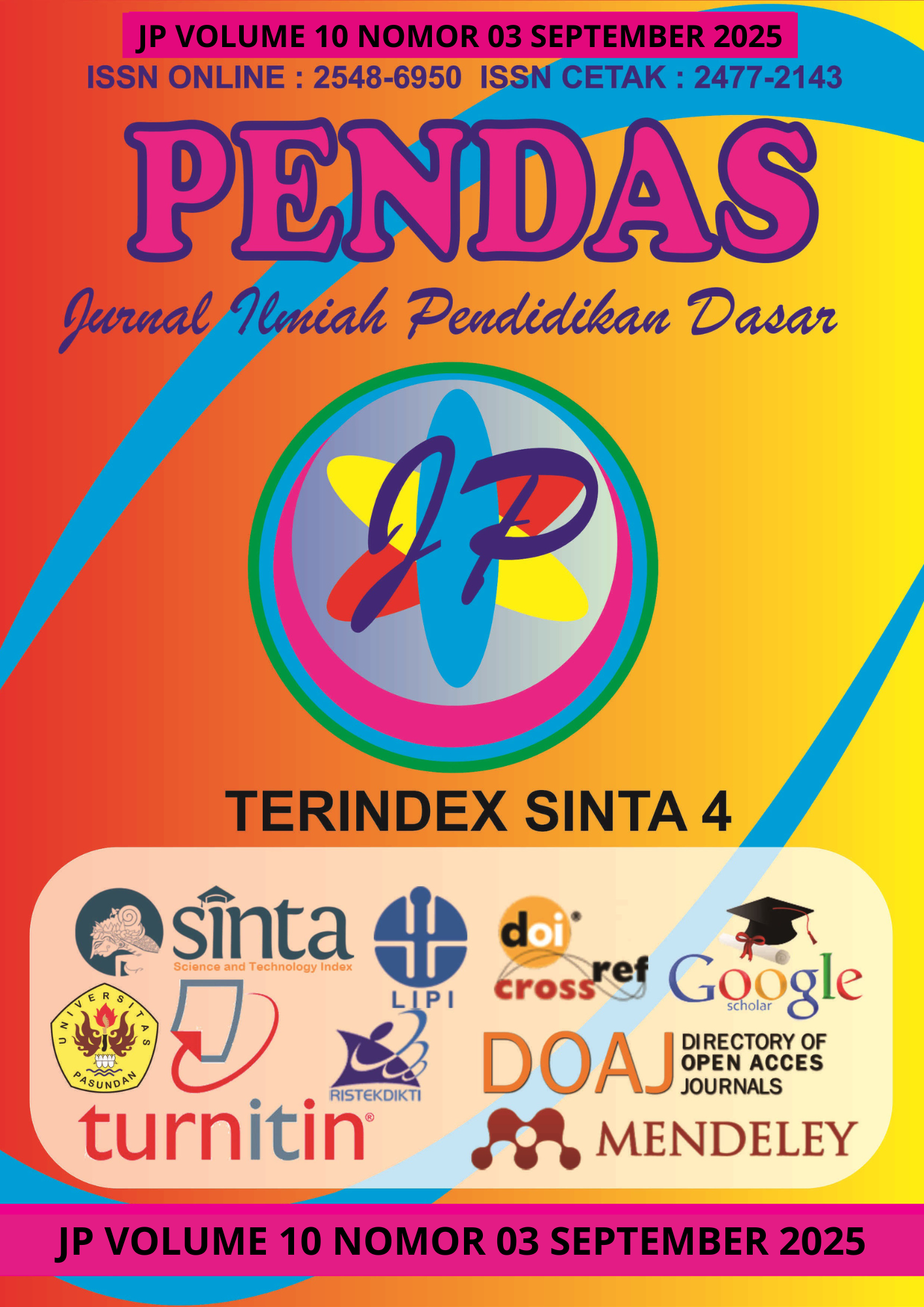HUBUNGAN KONTROL DIRI DENGAN PERILAKU MEMBOLOS SISWA KELAS XII DI SMAS SEMEN PADANG TAHUN AJARAN 2025/2026
DOI:
https://doi.org/10.23969/jp.v10i3.32252Keywords:
self control, correlation, education, truancy behaviorAbstract
This study aims to determine the relationship between self-control and truancy behavior of grade XII students at SMAS Semen Padang in the 2025/2026 academic year. The background of this study is based on the increasing truancy behavior carried out by students, which has the potential to disrupt the learning process and academic achievement. Self-control is seen as one of the important factors that can influence students' tendencies to engage in truancy behavior. This study uses a quantitative approach with a correlational method. The research sample consisted of 95 students taken from four grade XII classes proportionally. The instrument used was a Likert scale questionnaire to measure the level of self-control and truancy behavior. Data were analyzed using normality tests, linearity tests, and Pearson Product Moment correlation tests. The results of the normality test showed that the data were normally distributed with a significance value of 0.085 (> 0.05). The results of the linearity test showed that the relationship between the two variables was linear with a significance value of deviation from linearity of 0.638 (> 0.05). The results of the correlation test showed a significant negative relationship between self-control and student truancy behavior, with a correlation coefficient of -0.416 and a significance value of 0.000 (<0.05). This means that the higher a student's level of self-control, the lower their tendency to truancy. Based on these findings, it is concluded that self-control plays a significant role in suppressing student truancy behavior. Therefore, guidance and counseling teachers, subject teachers, and school officials need to pay attention to helping students improve self-control through psychological guidance and character development programs. This study can also serve as a reference for future researchers to develop studies related to truancy behavior by considering other relevant factors.
Downloads
References
Balaka, M. Y. (2022). Metode penelitian Kuantitatif. Metodologi Penelitian Pendidikan Kualitatif, 1, 130.
Berlianti, D. F., Abid, A. Al, & Ruby, A. C. (2024). Metode Penelitian Kuantitatif Pendekatan Ilmiah untuk Analisis Data. Jurnal Review Pendidikan Dan Pengajaran, 7(3), 1861–1864.
Desfi, A., Fillianto, C., & Ernawati, S. (2022). Peran Guru Bimbingan Konseling Dalam Mengatasi Perilaku Membolos Siswa SMA Negeri 1 Ngemplak. Senriabdi , 2, 339–354. https://www.jurnal.usahidsolo.ac.id/index.php/SENRIABDI/article/view/1123
Hasbi El Zahro Aurana, Damayanti Rima, Hermina Dina, M. H. (2023). PENELITIAN KORELASIONAL. Jurnal Pendidikan Dasar Dan Sosial Humaniora, 43(4), 342–346.
Karimah, M., Nurhayati, D., & Indarti, N. (2022). Pengaruh Penggunaan E-Money, Fitur Live Streaming, dan Literasi Digital Terhadap Perilaku Konsumtif pada Pembelanjaan Online. Jurnal Equilibrium Nusantara, 1(1), 8–15. https://doi.org/10.56854/jeqn.v1i1.26
Laila, R. A., Indarti, N., & Pradikto, S. (2023). Pengaruh Keselamatan dan Kesehatan Kerja Terhadap Produktivitas Kerja Karyawan di Koperasi Usaha Tani Ternak ( KUTT ) Suka Makmur Grati Kabupaten Pasuruan. 1(2), 47–54. https://doi.org/10.56854/jeqn.v1i2.85
Mandalika, A. (2016). Pengaruh Struktur Aktiva, Struktur Modal, dan Pertumbuhan Perusahaan pada Perusahaan Publik yang Terdaftar di Bursa Efek INdonesia. E-Jurnal Manajemen Universitas Sam Ratulangi, 16(01), 207–218.
Rini, R., & Muslikah, M. (2020). Hubungan Peran Keluarga dan Kontrol Diri dengan Perilaku Membolos Siswa. KONSELING EDUKASI “Journal of Guidance and Counseling,” 4(1), 17–34. https://doi.org/10.21043/konseling.v4i1.7415
Ruaidah, N. H. Z. (2023). Pengaruh Teman Sebaya Terhadap Psikososial Remaja. Jurnal Penelitian Ilmu Pendidikan Indonesia, 2(2), 146–152.
Sumianto, Admoko, Dewi, & Dewi, I. (2024). Indonesian Research Journal on Education Pembelajaran Sosial-Kognitif di Sekolah Dasar. Indonesian Research Journal on Education, 4(4), 102–109. https://www.google.com/search?q=https://irje.org/index.php/irje
Suriani, N., Risnita, & Jailani, M. S. (2023). Konsep Populasi dan Sampling Serta Pemilihan Partisipan Ditinjau Dari Penelitian Ilmiah Pendidikan. Jurnal IHSAN : Jurnal Pendidikan Islam, 1(2), 24–36. https://doi.org/10.61104/ihsan.v1i2.55
UNICEF (United Nations Children’s Fund). (2021). Profil Remaja 2021. Unicef, 917(2016), 1–9.
Wahdini Surizal Putri, D., Fitria, L., & Sefriani, R. (2023). Hubungan Kontrol Diri dengan Perilaku Membolos Siswa SMK N 7 Padang. Jurnal Pti (Pendidikan Dan Teknologi Informasi) Fakultas Keguruan Ilmu Pendidikan Universita Putra Indonesia “Yptk” Padang, 10(2), 112–117. https://doi.org/10.35134/jpti.v10i2.171
Wahyuni Damba Firda, B. S. I. (2024). Hubungan Dukungan Keluarga Dengan Kenakalan Remaja SMK N 1 Padang Tahun 2024.
Published
Issue
Section
License
Copyright (c) 2025 Pendas : Jurnal Ilmiah Pendidikan Dasar

This work is licensed under a Creative Commons Attribution 4.0 International License.



















